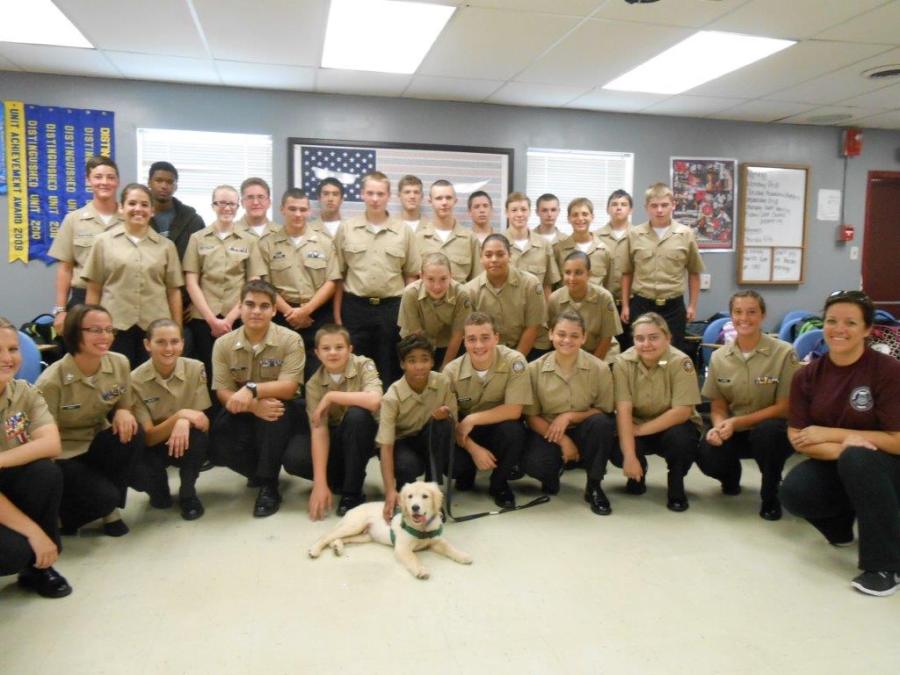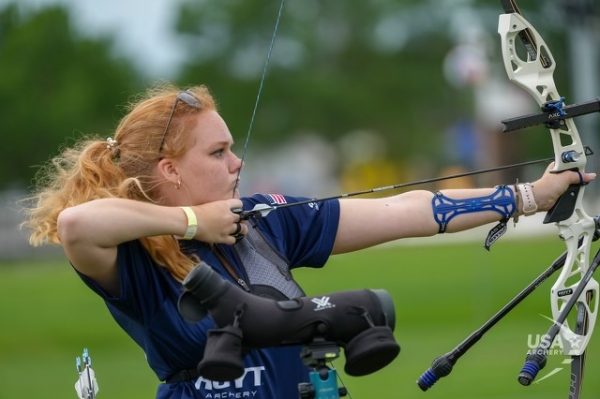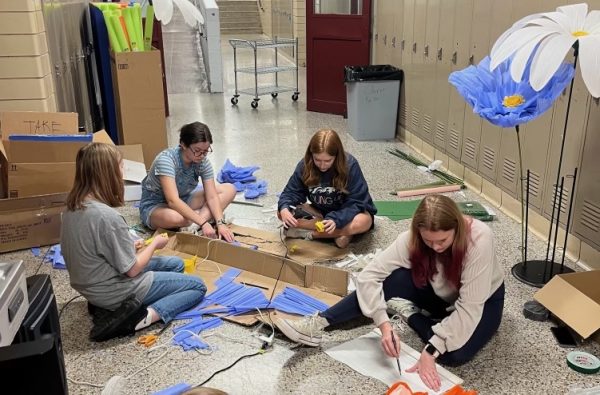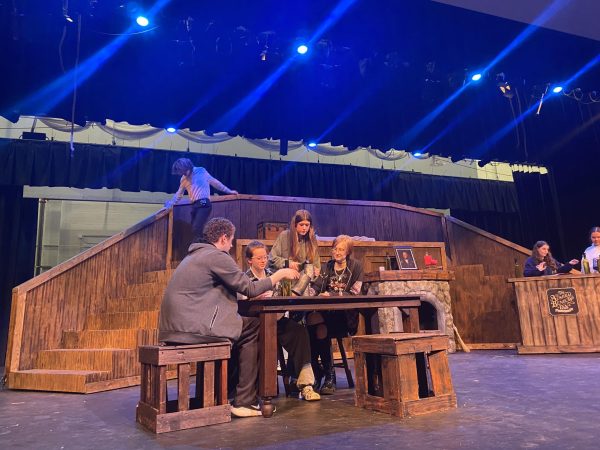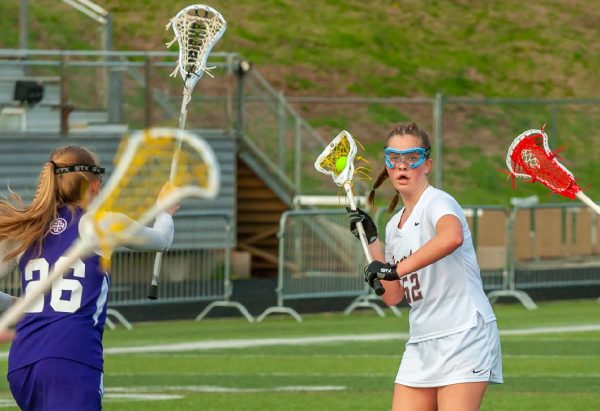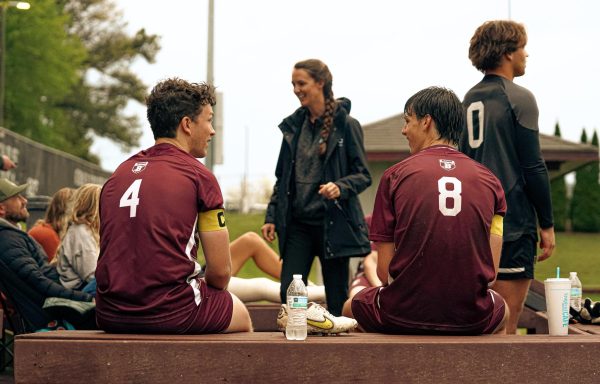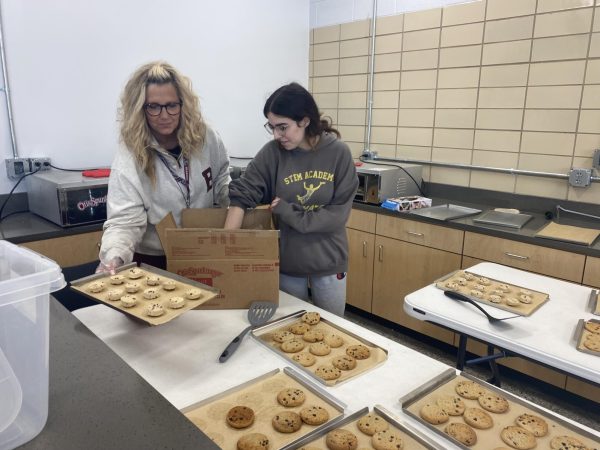ROTC’s service dog project requires thorough training of puppies
Bearden’s NJROTC poses with Patriot, the next service dog the group is sponsoring. ROTC is still accepting donations.
October 7, 2014
Many people have heard about the new service dog Bearden’s NJROTC is funding, and a few have even had the privilege of patting his adorable fuzzy head. However, not many people know about the incredibly tedious two-year process that goes into choosing and training Patriot.
Smoky Mountain Service Dogs has worked with Bearden’s ROTC since 2011, when ROTC first started funding for a puppy they named Bearden, who recently graduated last July and is currently in Nashville serving a veteran named Robert Harris. ROTC is now collecting to fund training for Patriot, a puppy whom they hope will one day follow in Bearden’s footsteps by working with another veteran.
Mike Kitchens is the volunteer spokesperson and board chair member of Smoky Mountain Service Dogs, an organization dedicated to training service dogs for disabled veterans and autistic children. The organization consists of three professional trainers and several volunteer workers.
The training process begins with choosing the most adequate puppy out of the litter using a series of tests to indicate the puppy’s personality.
“These tests give us a headstart for [training] the puppy,” Kitchens said. “It will not ensure that the puppy will make it all the way through our program, but it certainly increases the chances of that puppy being successful.”
Certain traits that are important include curiosity, passivity, and an excellent food-drive. Food-drive is a term used to describe how certain puppies are kept better focused by food motivation.
“[Trainers] will do things like a bang test, and the puppies will be out [in a room] and [the trainer will] make a loud noise, and the puppies might scurry off, and what we look for is… a puppy that goes away and then comes back with a degree of curiosity,” Kitchens said.
The amiability of the puppy is also worthy of testing. The sociability of the dog is important both in training, and then life after training, because the dog will inevitably meet unfamiliar people and animals.
“Another thing they will do is take the puppy and lay the puppy on its back and see if it will stay on its back while you rub its stomach,” Kitchens said. “That is somewhat a measure of socialization.”
Smoky Mountain Service Dogs mostly works with labradors and retrievers. These breeds’ large sizes are valued because they often work in mobility harnesses. Probably their most significant attribute is their retrieval skills, which serves a critical use for people who are physically disabled.
“So when we have a veteran who is on prosthetic legs, and his prosthetic legs are off, it’s important that the dog retrieve his telephone from other places in the home, [or] retrieve a rope to help pull the veteran up if he needs help,” Kitchens said. “So the retrieval skills of those dogs are very high.”
Not to mention, these breeds have an especially high food-drive. Though puppies are the organization’s main focus, older dogs sometimes also receive training.
After being chosen, the two-year long path of training to be a qualified service dog begins. Not all dogs successfully graduate; only the most intelligent and driven do so.
The training process revolves around food motivation. Basically, every time the puppy learns and obeys a task, he or she receives a small treat. This is the basis for motivating dogs in almost any circumstance, whether it’s the professional training of service dogs or teaching the average pet a few amusing tricks.
“With our puppies, we train them as soon as we get them, which is about eight weeks,” Kitchens said. “In just a matter of a very few days, we’d have that puppy sitting on command, and going down on command.”
Per dog, the entire training process takes about 1500-1800 hours. Currently, the organization is in the process of training 11 dogs.
“We have to balance the number of mature dogs we have with puppies,” Kitchens said. “We can’t have all puppies, and we can’t have all mature dogs.”
Dogs, like people, lose patience and don’t have an infinite attention span, so the training session is typically around an hour long, with reinforcement throughout the day by the volunteer workers.
“It’ll be a couple of years down on the road before Patriot will be ready to be matched with a veteran if he does well, and he will,” Kitchens said.
People interested in contributing donations to the organization or seeing videos of Bearden can visit their website here.
